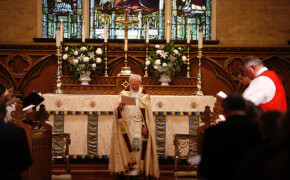One Does Not Get Chummy with the Almighty

And [Jacob] was afraid, and said, "How awesome is this place! This is none other than the house of God, and this is the gate of heaven."-Genesis 28:18
My Church History professor in seminary was a Lutheran pastor. He would often say in class, "One Does not get chummy with the Almighty." He would always say it with a wry smile on his face.
I think that is why Jacob was afraid. He had encountered God in a profound way. Once he realized it, he became afraid. Moses experienced the same thing and took off his shoes because he was standing on holy ground.
Yes, at the crucifixion, God tore the veil of the Temple in two so that, as Hebrews tells us, we can "boldly approach the throne of grace" (Hebrews 4:16). But let us not lose the sense of holy ground in our lives. Let us have an appropriately "fearful awe" of the Creator of the Universe.
When have you been on holy ground? When have you encountered the presence of God in your life in a profound way? How have you lived your life in response?
C.S. Lewis describes this "fearful encounter" with God throughout his writings. He calls it Joy. In Surprised by Joy, he describes his experience in this way. Joy, according to Lewis, is neither happiness nor pleasure. Instead, it is a desire for a place where we have never been. It is a voice that beckons for another land.
"For those who are still disposed to proceed I will only underline the quality common to the three experiences; it is that of an unsatisfied desire which is itself more desirable than any other satisfaction. I call it Joy, which is a technical term and must be sharply distinguished both from Happiness and Pleasure. Joy (in my sense) has indeed one characteristic, and one only, in common with them; the fact that anyone who has experienced it will want it again. Apart from that, and considered only in its quality, it might almost equally well be called a particular kind of unhappiness or grief. But then it is a kind we want. I doubt whether anyone who has tasted it would ever, if both were in his power, exchange it for all the pleasure in the world. But then Joy is never in our power and pleasure often is." (pp. 17-18)
He describes his own conversion to Christianity in this way: At last, Lewis "admitted that God was God, and knelt and prayed: perhaps that night, (he was) the most dejected and reluctant convert in all England." In retrospect, he acknowledges that God compelled him to come home when he was a prodigal son "brought in kicking, struggling, resentful, and darting his eyes in every direction for a chance to escape" And he realized that "The hardness of God is kinder than the softness of men, and His compulsion is our liberation." (p. 229) May we each find such Holy ground in our lives.

